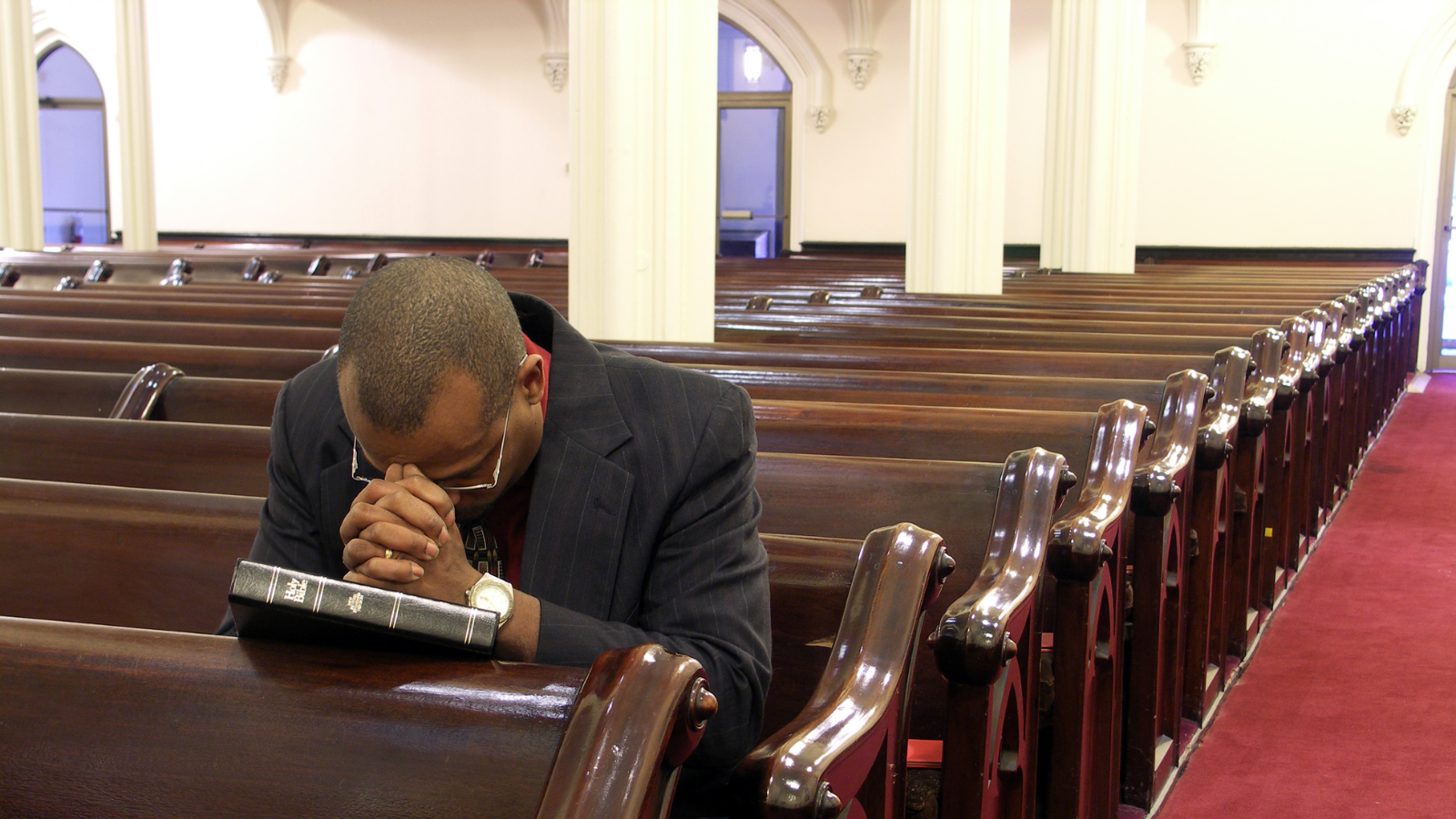Do you believe that if you pray hard enough, have enough faith, and give enough money to your church, God will be obligated to bless you with all the health, wealth, and happiness you’re entitled to?
Known as the Prosperity Gospel, this not-uncommon but highly-concerning Christian belief has a strong hold in some American churches.
Recently, American political scientist and statistician Ryan Burge compiled an insightful article entitled “Who Believes in the Prosperity Gospel?” in which he looks at the data surrounding this popular movement.
Here are some of his findings and why they matter.
What is the Prosperity Gospel?

The Prosperity Gospel, also known as Prosperity Theology, is the belief within certain Christian circles that teaches that God rewards faith, prayer, and financial generosity with health, wealth, and success.
According to Ligonier Ministries, the Prosperity Gospel consists of four main beliefs:
- Jesus purchased all the benefits of salvation for this life.
- If a person believes in Jesus, he will inherit great possessions and tangible blessings in this life.
- The way to gain riches is to give more money to the kingdom. The more you give, the more you get.
- If individuals continue to suffer afflictions or poverty, it is due to their lack of personal faith.
When taken to the extreme, this doctrine essentially teaches that Christians are entitled to God’s blessings that Jesus purchased for us on the cross. As a result, God is contractually obligated to bless Christians with health and wealth if we have enough faith.
Who Teaches the Prosperity Gospel?

While you can find snippets of the Prosperity Gospel here and there in many churches, some pastors and televangelists have earned themselves a reputation for this particular type of teaching.
In his article, Ryan Burge shares,
“If someone asks me who the most famous preacher in the United States is, the answer is honestly quite simple. It’s Joel Osteen, by a mile. He leads Lakewood Church in Houston, Texas. His congregation meets in what used to be the home of the Houston Rockets basketball team. Its seating capacity is nearly 17,000. Osteen’s first book Your Best Life Now sold a reported eight million copies.”
Other popular preachers known for (or suspected of) teaching the Prosperity Gospel: include Oral Roberts, Paula White, Kenneth Copeland, Benny Hinn, T.D. Jakes, Jesse Duplantis, and Creflo Dollar, though traces of the teachings can easily sneak into any sermon.
Where is the Prosperity Gospel in the Bible?

Proponents of the Prosperity Gospel often use the following Bible verses to support their beliefs:
- Malachi 3:10: “‘Bring the whole tithe into the storehouse, that there may be food in my house. Test me in this,’ says the Lord Almighty, ‘and see if I will not throw open the floodgates of heaven and pour out so much blessing that there will not be room enough to store it.'”
- Deuteronomy 8:18: “But remember the Lord your God, for it is he who gives you the ability to produce wealth, and so confirms his covenant, which he swore to your ancestors, as it is today.”
- Matthew 6:33: “But seek first his kingdom and his righteousness, and all these things will be given to you as well.”
While these verses (and others) do demonstrate that God is the one who provides all blessings and that He loves to bless His people, they are typically used out of context, distorting their original meaning and applying them how they were never meant to be applied.
Does the Bible Teach the Prosperity Gospel?

Read the Bible as a whole and you’ll find that, while some verses do seem to support the Prosperity Gospel, many others strongly refute it.
In fact, the Bible is full of verses and stories about very godly men and women who struggled through poverty or illness through no lack of faith and no fault of their own.
For example:
- John 16:33: “I have told you these things, so that in me you may have peace. In this world you will have trouble. But take heart! I have overcome the world.”
- Matthew 19:21: “Jesus answered, ‘If you want to be perfect, go, sell your possessions and give to the poor, and you will have treasure in heaven. Then come, follow me.'”
- John 9:2-3: “His disciples asked him, ‘Rabbi, who sinned, this man or his parents, that he was born blind?’ ‘Neither this man nor his parents sinned,’ said Jesus, ‘but this happened so that the works of God might be displayed in him.'”
- Job 1:1, 2:7 “In the land of Uz there lived a man whose name was Job. This man was blameless and upright; he feared God and shunned evil… So Satan went out from the presence of the Lord and afflicted Job with painful sores from the soles of his feet to the crown of his head.”
- Matthew 6:19-20: “Do not store up for yourselves treasures on earth, where moths and vermin destroy, and where thieves break in and steal. But store up for yourselves treasures in heaven, where moths and vermin do not destroy, and where thieves do not break in and steal.”
How Pervasive is the Prosperity Gospel in Today’s Churches?

Just because some famous preachers and televangelists promote the Prosperity Gospel from their platforms doesn’t automatically mean that the majority of the Christian faithful are buying it, however.
While recent data is sparse, Burge shares data from a 2012 General Social Survey that includes two questions specifically focused on some of the basic tenets of prosperity theology.
According to the data, only 9% of Americans reported reading the Bible specifically to learn about attaining health and healing, while only 5% read it specifically to learn about attaining wealth and prosperity.
This isn’t necessarily a problem. We should turn to God’s Word to see what it says on this issue!
As a result of his findings, Burge concludes,
“It’s fairly evident from this data that prosperity theology is not pervasive across the American public. In fact, 45% of respondents say that they never read the Bible to learn about attaining health or healing and 63% have never looked to the scriptures to learn about how to obtain wealth or prosperity.”
Who Believes the Prosperity Gospel? Non-White Christians, Primarily

While the Prosperity Gospel certainly isn’t limited to one race, gender, or even denomination, Burge found evidence in the data that non-white Christians are far more likely to believe the Prosperity Gospel than white Christians.
Burge writes,
“And, the data here is as clear as it could be…
Just six percent of white Christians chose one of the top two options when it comes to learning about prosperity from the Bible, it was 24% of non-white Christians. There’s just no escaping this conclusion – reading the Bible to learn about attaining health, healing, wealth, or prosperity is more pervasive among American Christians of color.“
Unfortunately, there simply isn’t enough data to dive into this statistic further — separating Black, Hispanic, Asian, etc. respondents into separate groupings to look for overarching trends.
Who Believes the Prosperity Gospel? Those in Lower Tax Brackets As Well

Continuing to look for statistically significant trends, Burge analyzed the data by income level as well.
His findings:
“The results are striking – Americans at the lower end of the income distribution are much more likely to look toward the scriptures as a way to find a pathway toward prosperity. Among those making less than $40,000 a year as a household, about two-thirds said that they looked to the Bible for advice about health and healing and a bare majority said the same for wealth and prosperity.”
By contrast, “among those making at least $75,000 per year, just 22% say that they have used the Bible as a guidebook on financial success.”
There’s No Statistical Difference Due to Age, Gender, or Partisanship

By contrast, Burge found no statistical difference in how likely people are to believe in or accept the Prosperity Gospel due to factors including age, gender, or partisanship.
Old or young, man or woman, Republican or Democrat… these factors make little to no difference in how the survey respondents answered.
Why is the Prosperity Gospel so Problematic? It’s Not Biblical

Perhaps the biggest problem with the Prosperity Gospel is that, as we saw above, it’s teachings are not biblical.
While it’s not a sin to be (or want to be) healthy, wealthy, and blessed, we certainly fall into sin when we start acting entitled, as though God “owes” us anything, especially due to anything we have or haven’t done.
Furthermore, the Bible is clear in James 3:1 that teachers are held responsible for teaching, leading, and guarding those they teach wisely.
“Not many of you should become teachers, my fellow believers, because you know that we who teach will be judged more strictly.”
In the New Testament, it isn’t the “sinners” that Jesus has an issue with — it’s the supposed “religious” leaders who intentionally or unintentionally lead others astray due to their own pride and arrogance.
The Prosperity Gospel is a Form of Victim Blaming

Another major issue with the Prosperity Gospel is that it can easily lead to victim blaming, where we assume that those who are poor, sick, or injured are “less favored” by God or don’t have enough faith.
While blessings can be a sign of God’s favor, a lack of obvious blessings is not always a sign of God’s displeasure.
Job, Elijah, Jesus, Jesus’s disciples, John the Baptist, and the apostle Paul all faced great hardships and poverty, even though they were each incredible men of God.
Taken to the extreme, this line of thinking can even lead some people to not take action to improve their situation (or encourage others to not take action), because they believe that God will take care of it.
It’s always sad to hear that some people don’t receive the proper medical care or therapy they need because of false beliefs like this one.
The Prosperity Gospel Can Fuel Greed and Entitlement

Just as problematic, those who are blessed with wealth, health, and other Earthly blessings might use their status as a source of unfounded pride or to justify their greed.
As long as they are still healthy and wealthy, the Prosperity Gospel makes it easy for them to justify almost any action or inaction, even if it hurts or exploits other people in the process.
After all, God must be happy if He’s still blessing them, right?
The Prosperity Gospel is Exploitative

Another major problem with the Prosperity Gospel is that it makes it easy for a select few to prey on and take advantage of the masses.
This is a major issue many people have with the megachurch pastors and televangelists who promote this ideology.
What’s to stop unethical preachers from asking for more, more, more money, while lining their own pockets and growing their churches instead of actually helping those in need?
They can keep shaming their congregations and raking in the funds without taking any accountability for how they are or are not serving their people.
Is Being Wealthy Sinful?

To be clear: There is nothing inherently wrong with being (or wanting to be) healthy, wealthy, and successful.
Scripture is full of examples of very godly men and women who enjoyed great wealth, such as Abraham, King David, King Solomon, and Lydia.
The Bible never commands everyone to live in poverty, and we should try to improve our negative financial situation or worrying health diagnosis if we can.
However, we must be careful to keep our motives in line. While it is good and noble to provide for our families, enjoy the blessings God has given us, and use our resources to help others (including our churches), we should never make money an idol.
We need to be careful to stay far away from greed, entitlement, comparison, jealousy, discontentment, selfishness, and self-centeredness, all of which the Prosperity Gospel promotes.
Is Dave Ramsey Right About Debt? Here’s What the Bible Really Says

In his popular radio program and podcast, Dave Ramsey has made a lot of money telling people they shouldn’t have debt. His plan encourages people to go to extreme measures to pay off debt and stay out of debt–including buying used cars and never using credit cards.
While thousands of people have achieved their debt-free goals using his plan, others say it’s foolish or even crazy!
Dave says his plan is based on Biblical principles, but he’s often criticized for his views on money and debt.
Read what the Bible has to say about money and decide for yourself if Dave is right or wrong.
Is Dave Ramsey Right About Debt? Here’s What the Bible Really Says
The Tithing Debate: 12 Reasons Why You Should Support Your Church Financially

Just because some Christians ministries misuse money doesn’t mean we should stop giving altogether.
Tithing, the practice of giving a portion of one’s income to a church or religious institution, has been a longstanding tradition in many faiths.
While it may seem like a financial sacrifice, tithing can have profound benefits for individuals and communities.
Here are 12 reasons you should make tithing a regular part of your giving.
The Tithing Debate: 12 Reasons Why You Should Support Your Church Financially
Brittany Ann is an ECPA bestselling author and founder of Equipping Godly Women and Monetize My Ministry. She’s also a Christian speaker, podcaster, and conference host. Her work has been featured on numerous TV, radio, and online ministries, including CBN, MSN, Christianity Today, Evangelical Alliance, Patheos, Crosswalk, and more.

